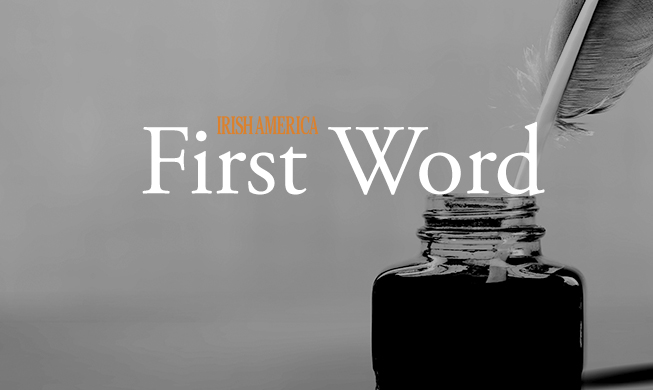
Thomas Keneally’s latest book The Great Shame should be in every Irish household, and it should be read, all 700 or so pages of it, by anyone with an interest in the history of Ireland. It is a great book, wonderfully written by the Irish Australian author of Schindler’s List.
Beginning with the tale of Hugh Larkin, a twenty-four-year old rebel transported for life in 1833, The Great Shame describes the Ireland that these prisoners left and the future they encountered in Australia.
The Irish in America are covered here too; the great story of the whaling ship Catalpa, commissioned by John Boyle O’Reilly (editor of The Boston Pilot) to rescue his fellow Fenians, including John Meagher. We are pleased to publish an extract of the book in this issue, one which covers the welcome afforded to Meagher on his arrival in America and in particular New York.
Reading Keneally’s book one wonders how we survived as a race at all. But I’m writing this in the middle of an Irish popularity streak that shows that not only did we survive but we prospered. The economy is booming on the home front, and internationally, our artistic endeavors have brought new meaning to the term ‘Irish.’
Not everyone, of course, thinks this global appreciation of everything Irish is a good thing. Singer Scan Casey recently interviewed in Hot Press said, “They’ve made it like a fad…People want to buy Irish culture so we are selling it…When they start putting Irish theme pubs in [Dublin] it becomes ridiculous.”
But, no matter, we continue to glow in the spotlight, and not just on Broadway where Irish plays are running three at a time. The Film Society of Lincoln Center recently presented two weeks of Irish films and four other prominent New York institutions are currently participating in what is being called an “Irish Arts Celebration.”
Meanwhile one can’t walk into a store without hearing the plaintive swains of Enya. If it’s not the Cranberries, it’s my 13-year-old Californian niece looking for an autograph of B(*)Witched. For my mother and her friends and yes, me too, it’s the three Irish Tenors. And then of course, there’ s the Guinness Fleadh taking center stage across the U.S. this summer.
It’s a great time to be Irish, and you can’t get away from it. In Taos, New Mexico, I recently overheard a conversation on the merits of young Irish writer Colum McCann.
So, when the New York Public Library called to invite me to an exhibition honoring W.B. Yeats, I was hardly surprised. Why shouldn’t he be in on the glory too? What would our renowned poet, whose work evoked the heroic and nationalist spirit and helped to nourish the dream of independence — the man who left us forever with the line “Ireland a Terrible Beauty” — think of us now?
Have we finally shrugged off `the great shame?’
The title of his book, Keneally says, comes from the mass starvation of our people in the 1840s and subsequent emigration which cut our population in half. This loss, he says, “is believed by some to have created in the Irish themselves a certain amount of that survival shame which characterizes victims of the Holocaust.”
Could be.
In the Ireland I grew up in, to bring disgrace on the family was the worst sin. Girls who got pregnant out of wedlock were banished to the fringes of society to live out their lives in servitude. There was an unnatural fear of being different. Conformity was the role, with dire consequences for those who didn’t comply.
Whether they are rooted in the Famine or are simply part of a legacy inherited from centuries of brutal colonization, such shameful condemnations are thankfully becoming a thing of the past, and a new confidence has taken hold as is evidenced by our global success.
But for all our accolades, the one thorn in the side that continues to put a damper on the applause, is the situation in the North.
In the closing paragraph of his book Keneally refers to our long suffering struggle for freedom. The Great Shame he says, “might also be seen as referring to the unachievement of the ideal of a united Ireland by the nineteenth century rebels.”
The author concludes his great saga thusly: “At the time of writing, through the goodwill of the governments of the Republic of Ireland, Britain, the United States, of the mass of Republican and Loyalists, and in the context of an increasingly unified Europe where Davis or Mitchel’s nineteenth-century concept of sovereignty seems less and less realistic, there is hope of peace in Ulster, and an end to shame.”
Could be.
As we face yet another tinderbox summer in the North, we must hope that while the past continues to be celebrated on canvas and celluloid and in the written word, it does not takes precedence over the future. It would be a great shame if it did.
Editor’s Note: This article was originally published in the August / September 1999 issue of Irish America. ⬥


Leave a Reply